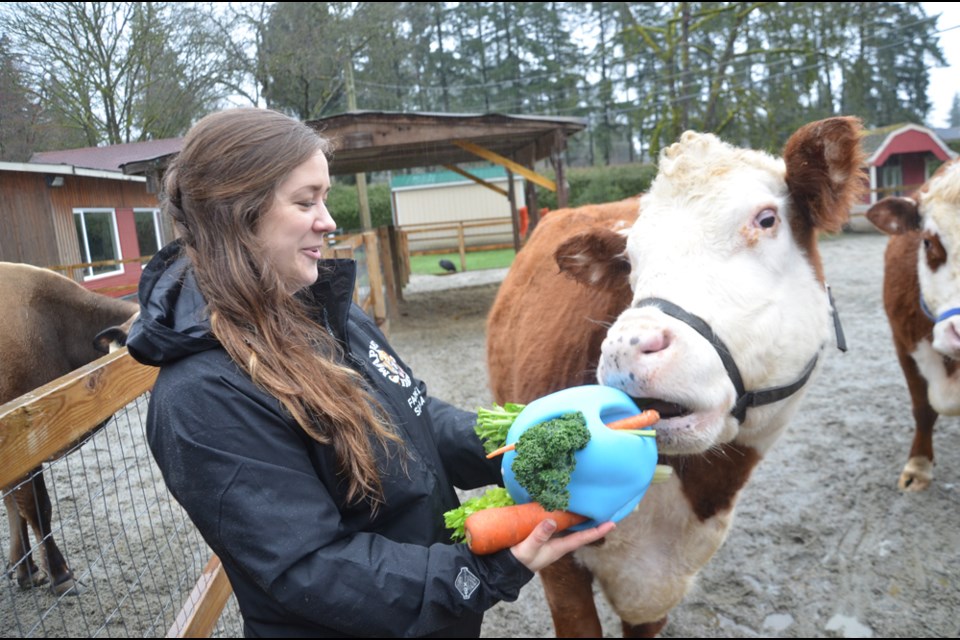Selina Merrick, Maplewood Farm supervisor, pulls open the doors of a delivery van and welcomes the bounty inside: five boxes of produce from the Park & Tilford Save-On-Foods that will soon be fed to the farm’s flock of horses, pigs, cows and goats.
“Score!” she says. “We love apples, carrots and any root vegetable, and so there's a lot of parsnips and stuff in there, too.”
Five boxes may not seem like a lot but it’s part of a larger effort to cut back on the many tonnes of food grown in Canada every year that ends up getting tossed out. FoodMesh, a local startup with a mandate to divert food from landfills to hungry tummies, got the District of North Vancouver-owned non-profit farm connected with Save-On.
When a load of produce arrives at the store, there’s quite a lot that won’t make it to a plate.
“We help organizations that have food they can no longer sell, for a multitude of reasons, maybe because it's close to expiring, or maybe that it’s bruised, or it's esthetically imperfect,” said Megan Czerpak, head of communications, FoodMesh. “We have found that 58 per cent of food in Canada is never eaten. So there's an enormous opportunity here to help organizations with that food waste and divert to higher-end uses.”
About one in eight households in Canada experiences food insecurity so two-leggeds get priority over four-leggeds, but there’s still more than enough for a weekly delivery to the farm, Czerpak said, especially as some produce that isn’t fit for humans is perfectly fine for animals.
If there are any imperfections in the produce, Judy doesn’t care.
“Judy goes bonkers for lettuce,” Merrick says of the Herford cow, craning her neck to snatch another leaf from a bowl. “This isn’t trash lettuce. Everything is still ripe and beautiful, and just because it can’t go on store shelves, that doesn’t mean that we’re not super happy to have it.”
Different animals enjoy different treats. The cows love leafy greens, including cilantro and parsley. Pigs love sweet potatoes and, especially, grapes.
“There are no complaints,” Merrick said with a laugh. “Everybody's happy with carrots and apples. Those are probably our biggest sellers.”
It’s not the main source of nutrition for the farm’s animals. They eat grains and hay mostly, but there’s plenty of good stuff in the fruits and veggies.
“It's still something that's important for them to get every day so that their lives are enriched, and they're happy and healthy,” Merrick said, noting the farm used to spend upwards of $150 per week on treats for Maplewood’s critters. “Now that we're not spending near as much on produce … that money can just be allocated to other needs and structures, and enrichment and toys and bettering the farm.”
In 2018, Save-On-Foods started a program to divert perishable foods away from the compost and landfill and to food banks and farms. It was part of a larger initiative from major food retailers to reduce their food waste by half by 2022.
“We've well exceeded that,” said Bruce Currie, Save-On-Foods energy and sustainability manager. “To date, we’ve diverted about 43 million kilograms.”
Staff in the produce department, some who have more than 30 years of experience, have enjoyed contributing to program, he added.
“They absolutely love it,” he said. “They think this is so cool.”
The cost of feeding livestock is rising quickly, which inevitably means higher food prices. Currie said diversion from grocery stores saves some farmers about $1,000 per month.
Cutting back on needless waste isn’t just something that can be dealt with at the retail level, Czerpak said. Families can help by putting a little more thought into meal planning, making sure they’re only buying what they need, and finding ways to put leftovers to use, rather than letting them rot.
“There's an enormous amount of food waste actually happening on the household level,” she said.
Learn more through Love Food Hate Waste Canada.



